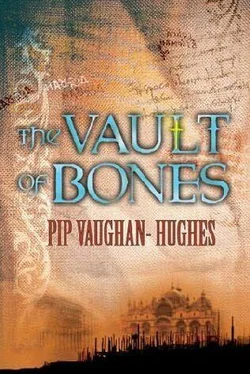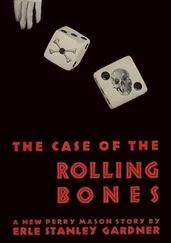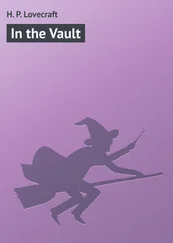Pip Vaughan-Hughes - The Vault of bones
Здесь есть возможность читать онлайн «Pip Vaughan-Hughes - The Vault of bones» весь текст электронной книги совершенно бесплатно (целиком полную версию без сокращений). В некоторых случаях можно слушать аудио, скачать через торрент в формате fb2 и присутствует краткое содержание. Жанр: Исторический детектив, на английском языке. Описание произведения, (предисловие) а так же отзывы посетителей доступны на портале библиотеки ЛибКат.
- Название:The Vault of bones
- Автор:
- Жанр:
- Год:неизвестен
- ISBN:нет данных
- Рейтинг книги:4 / 5. Голосов: 1
-
Избранное:Добавить в избранное
- Отзывы:
-
Ваша оценка:
- 80
- 1
- 2
- 3
- 4
- 5
The Vault of bones: краткое содержание, описание и аннотация
Предлагаем к чтению аннотацию, описание, краткое содержание или предисловие (зависит от того, что написал сам автор книги «The Vault of bones»). Если вы не нашли необходимую информацию о книге — напишите в комментариях, мы постараемся отыскать её.
The Vault of bones — читать онлайн бесплатно полную книгу (весь текст) целиком
Ниже представлен текст книги, разбитый по страницам. Система сохранения места последней прочитанной страницы, позволяет с удобством читать онлайн бесплатно книгу «The Vault of bones», без необходимости каждый раз заново искать на чём Вы остановились. Поставьте закладку, и сможете в любой момент перейти на страницу, на которой закончили чтение.
Интервал:
Закладка:
I was blinking the sleep from my eyes when I felt her hand, cold and strong, slide up my spine until it lay, fingers trembling slightly, against the back of my neck. My hair rose to meet it, and as I leaned, eyes closed, to meet her lips with mine, I knew that I was stepping from the known world into the blank lands at the edge of a map: here be monsters. Her lips had been cool against mine, and I had almost drawn back, sensing that she was about to do the same, when her mouth opened slightly and I brushed against her teeth. We both shuddered, and for a long moment it was all heat and bruising, crushing, growling. I tasted blood and sweet spit, smelled her powdery-sharp sweat. Then, as if we were puppets and our mountebank had snapped his fingers, we jerked apart. But her eyes held mine for another desperate moment, and then she raised her pale hand and pointed. At first I could see nothing save the velvet shimmer of stars upon smooth water, and deepest shadow all around. Then, following her outstretched arm, I saw that the first inkling of dawn was lightening the east, turning the night from black to the blue of a magpie's wing. And there, faint, no more than the play of blue upon blue, the domes and spires of a city rose out of the starry brocade of the water.
Chapter Thirty
I saw nothing more of Venice until the boatman prodded me with his foot and I peered out from beneath the nets and the burlap to behold a wall of cut stone, crusted with wet moss and alive with little grey crabs, and a thick pole striped with ancient yellow and black paint. Letice poked her head out beside me and took a shuddering breath. Her hair was plastered against her skull and her nose was running.
'Go!’ hissed the boatman. I dumped my bag on the top of the quay and clambered up, pulling Letice after me as soon as my feet were set. The boatman, without a backwards glance, began to heave at his oar, and in less than a minute we were alone. But where were we? I looked about us. The canal upon which we had arrived was no more than a tiny channel trapped between towering walls of brick, into which, here and there, had been let a marble-framed window. To our left the canal ended unceremoniously in another wall, and to our right was a narrow oblong of daylight through which we could glimpse blue sky, white buildings and boats passing on choppy water. That, then, must be the Grand Canal. In front of us were more striped poles, a little thicket of them, leaning this way and that. Sparrows hopped around their bulbous finials, and tiny silver fish flicked through them as they sank out of sight in the hazy canal. I kicked at some loose mortar between two mossy steps and looked up, to find that above us an ancient palace squatted, its stones streaked with grime and blotched with lichen like the hands of an old man. The steps led up to a row of plain columns that supported light, simple arches. Behind these I glimpsed two heavily barred windows and a large doorway. Above the arches another row of arched windows were set into the face of the building, interspersed and surmounted by stone plaques that seemed to show long-legged birds and stars. Above that, a plainer storey rose up, pierced here and there with more windows, these ones pointed.
I climbed the steps and walked cautiously between the columns and into the damp, mossy shadow of the arches. Stepping up to the doorway, I laid my finger upon the bronze knocker, a toothy fish pop-eyed in amazement at the taste of its own tail. I heard Letice climb the stairs behind me.
You remembered the key, didn't you?' she asked, casting a somewhat querulous look up at the looming palace. Glancing about, I made sure that we were not observed, but the windows that faced us were bricked or boarded up, and it seemed likely that the little canal had been left to itself for quite some time. I pulled out the set of burglars tools I had made aboard the Seynt Victor and addressed the lock. After an uncomfortable few minutes of scraping and cursing the hasps surrendered, the hinges rasped and groaned, and we stepped inside the Ca Kanzir. The Ca' Kanzir was not the true name of the palace on the Rio Morto. To the Venetians – those who even remembered its existence – it was the Palazzo Centranico. It was one of the oldest buildings in the city, and had survived floods and fire, for it had been built from stone at a time when most of its fellows were of wood, two hundred or more years ago. It had once housed a Doge, and the Captain had bought the place from the last member of that noble family. Over the years he had transformed it, inside if not out, into his one earthbound refuge. All this I had learned as we made our way up the eastern shores of Italy, and as the Captain found his voice and began slowly to mend. So, as I sat with pliers and files and a collection of ships' nails, making lockpicks for myself, he had created the Ca Kanzir in the air between us, each word brought forth carefully and with love. He had guided me through its halls and up its stairways, explaining, in loving detail, how the Venetians built their houses, until I marvelled that a man who had always seemed as rootless as one of the Athingani could be so wedded to a pile of ancient stone and brick.
Beyond the door stretched a wide, damp hallway, sequestered in mouldy gloom. I knew it would be there, for the Captain had drawn it for me in words. The walls were of wooden panelling, simply painted, with many doors leading off on either side. It was very dark, but I could make out huge, ungainly chairs and benches standing between the doors. The floor over which our shoes clicked was a simple chequerboard of white and red marble flagstones. At the far end was another door, which was not locked. We stepped through it and back into sunlight, into a small courtyard with high walls on all sides. In the centre stood a marble wellhead carved with spiky leaves and birds. Big pots of red clay lined the walls, and from them grew trees, some of which I recognised – there were lemons and oranges rotting upon the branches, and lying in green and mouldy heaps upon the ground, a fig and a small olive tree – and some I did not, strange plants with thick, hairy trunks and glossy leaves like huge ferns. Everything was dry and neglected and near death. Vines festooned the outer walls, and a tall rose-briar was scrambling up towards the sky. Odd carvings in many kinds of stone were set into the brickwork, seemingly at random, so that faces of birds and beasts, shields with noble devices, and swirling knots of carved greenery peered from among the leaves. A stone staircase with an ornate, though worn, rail of marble led up the side of the palace. It should have been beautiful here, for the Captain had described it as his refuge, his Eden. But old cobwebs cloaked the leaves and branches in grey and refuse-mottled tents and all was silent save for the rustle of a wren somewhere. It suddenly began to screech and scold us with its tiny voice. I shivered, and beckoned to Letice, who was peering down the well.
'No one there’ she said with a grin, but I knew she had not been jesting. Silently we climbed the stair and stepped into another long hallway paved with smooth, worn brick and lined with long benches strewn with plump silk cushions, silvery with dust. At the end was a long gallery that formed another loggia with the windows I had seen from the canal. There were tapestries on the walls, and old shields and lances. Strangely, the windows at both ends of the hallway held no glass, and an icy draught was flowing down towards us. As below, the hallway was lined with doors, and I opened one at random. Beyond it lay a large, white-walled room hung with far richer tapestries and strange, barbarous-looking weavings. Candles stood ready in tall, gilt candle-holders. There were wide, high-backed chairs brightly painted and stacked with pillows. A round table stood empty. Dust lay everywhere, criss-crossed with the roadways of mice and spiders.
Читать дальшеИнтервал:
Закладка:
Похожие книги на «The Vault of bones»
Представляем Вашему вниманию похожие книги на «The Vault of bones» списком для выбора. Мы отобрали схожую по названию и смыслу литературу в надежде предоставить читателям больше вариантов отыскать новые, интересные, ещё непрочитанные произведения.
Обсуждение, отзывы о книге «The Vault of bones» и просто собственные мнения читателей. Оставьте ваши комментарии, напишите, что Вы думаете о произведении, его смысле или главных героях. Укажите что конкретно понравилось, а что нет, и почему Вы так считаете.









